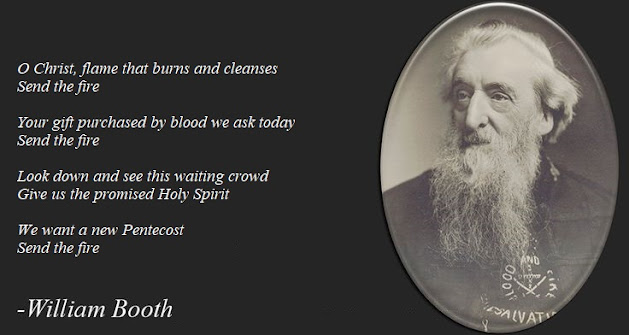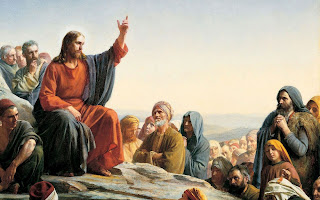Now when Joshua was near Jericho, he looked up and saw a man standing in front of him with a drawn sword in his hand.
Joshua went up to him and asked, “Are you for us or for our enemies?”
“Neither,” he replied, “but as commander of the army of the Lord I have now come.”
Then Joshua fell facedown to the ground in reverence, and asked him,
“What message does my Lord have for his servant?”
The commander of the Lord’s army replied,
“Take off your sandals, for the place where you are standing is holy.” And Joshua did so.
(Josh. 5:13-15, NIV) Believers called to engage in spiritual warfare during these end-time seasons can learn a great deal from Joshua’s lesson learned from the Commander of the Lord’s army—the very incarnate Son of God, Jesus Christ, Captain of the Lord of hosts.
It is significant that God the Father chose to call his incarnate Son JESUS—the Greek form of Joshua. Without Joshua’s encounter with the Heavenly Joshua, he could never have become a conqueror.
Those of us who are being called to Put on the full armor of God so that you can take your stand against the devil’s schemes. For our struggle is not against flesh and blood, but against the rulers, … the authorities, … the powers of this dark world and … the spiritual forces of evil in the heavenly realms (Eph. 6:11-12, NIV). We must have a greater revelation of Jesus Christ than we have ever known. We must behold our Lord Jesus Christ as a warrior (Ex. 15:3, NIV). Who is this King of glory? The Lord strong and mighty, the Lord mighty in battle (Ps. 24:8, NIV). We must learn with Joshua that the kind of warfare we are called to wage is Not by might nor by power, but by my Spirit, says the Lord Almighty (Zech. 4:6, NIV).
Joshua had his vision of the Commander of the Lord’s army in chapter 5.
But the Jericho victory would not come until later in chapter 6. The earthly Joshua must first worship the Heavenly Joshua and learn from Him the true secrets of spiritual warfare. The earthly Joshua must know that every effort exerted in human strength alone would fail. He had to learn what every spiritual leader must learn: Without God, we can’t; without us, God won’t! Let us all consider the three very important truths the Heavenly Joshua conveyed to the earthly Joshua before the battle of Jericho was launched.
1. “Joshua, taking Jericho is not your idea; it is God’s command!” Just as Moses had been called of God to lead the Israelites out of Egypt, Joshua had been called to lead them into the Promised Land, even after a generation of failures under Moses. He must feel himself under orders from Almighty God—the One who would be his highest authority to whom he would be accountable and depend on.
Christians, as we are facing end-time darkness spreading the Gospel, building the church, renewing believers, and seeing manifestations of the supernatural, let us remember that we have to undertake it all with a clear understanding that God Himself has prophesied, commanded, and directed our efforts. Jesus said, … I will build My church, and the … powers of the infernal region shall not overpower it … (Matt. 16:18, ANT). He made it clear that He would do this through His Spirit-anointed praying and the Church’s Spirit-empowered praying (Luke 24:49). Then he said in the last days I will pour out my Spirit on all people…sons and daughters will prophesy, …old men will dream dreams, …young men will see visions…I will pour out my Spirit in those days…and everyone who calls on the name of the Lord will be saved…(Joel 2:28-29, 32, NIV). The last days, according to the prophet Joel, would be characterized by many outpourings of the Spirit for preserving and perpetuating the Church. Outpourings of the Spirit would be the work of our Sovereign God, but these times of refreshing from the presence of the Lord would be conditioned by the faith, obedience, and intercession of the saints.
2. “Joshua, Jericho will not be taken by your weak army; it will be taken by divine, invisible forces!” The earthly armies of God do not impress the world, but the sinister forces of darkness are traumatized by those Spirit-filled men and women who put on the whole armor of God—the belt of truth (strengthened with the Gospel of truth), the breastplate of righteousness (covered by the integrity of Spirit-cleansing from sin), feet fitted with the readiness that comes from the gospel of peace (poised in battle with holy boldness), the shield of faith to extinguish the flaming arrows of the evil one (a Spirit-cleared mind to avert every doubt, fear, frustration, and temptation that would distract, discourage, or defeat), the helmet of salvation (bringing every thought into the captivity of Christ our Commander-in-Chief), and the sword of the Spirit, which is the Word of God (making the Scriptures our Word of testimony, which renders the enemy powerless), and praying at all times in the Spirit (passionately prevailing in intercessory prayer for His revealed will against the principalities, the rulers of darkness, the authorities and the hordes of wicked spirits operating in the heavenlies.
3. “Joshua, Jericho will not be taken for your glory; it will be taken for the glory of the Captain of the Lord of hosts!” My fellow believers, the kind of army that we must enlist in will not impress the world, nor will it attract a majority of the believers—
not even most of those who make up our evangelical churches today. The only kind of spiritual army that can prevail against the tide of evil that Satan has planned for our times will be made up of those who will persevere through all three stages of spiritual warfare—asking, seeking, and knocking.
Our Heavenly Joshua is our example. He became the divinely anointed Intercessor. Here’s how He prayed: During the days of Jesus’ life on earth, he offered up prayers and petitions with loud cries and tears … and He was heard because of His reverent submission (Heb. 5:7, NIV). In Luke 11:9-10, Jesus tells us how to persevere and prevail in prayer: So I say to you: Ask and it will be given to you; seek and you will find; knock and the door will be opened to you.
Asking is petition—it represents desire, stating a need, filing a claim.
Seeking is resolution—it represents committing to a course of continuing and prevailing in prayer.
Knocking is supplication—it represents desperation, burdened praying, crying out, pleading, begging, fasting, shedding tears, passion, agonizing, groaning under the load of revival praying. Too many believers consider this kind of praying extreme, fanatical, and foolish. May God multiply the number of spiritual warriors who will follow their Heavenly Joshua into this kind of revival praying until the Spirit gives them such a holy boldness that they will not be denied!
The great revivals of church history have been poured out after prolonged seasons of perseverance in burdened prayer and glorious praise. Spirit-filled prayer warriors learn early in revival praying that burdened praying goes with blissful praise. At the parting of the Red Sea, when God delivered His people and drowned their enemies with the same miracle, the Israelites with Moses exclaimed, Who … is like you, O Lord—majestic in holiness, awesome in glory, working wonders? You stretched out your right hand and the earth swallowed them. In your unfailing love you will lead the people you have redeemed … The nations will hear and tremble … (Ex. 15:11-14, NIV ).
I am convinced that America will see a mighty rending of the heavens only after a greater number of believers have been cleansed from sin, filled with the Spirit, and answer the call to desperate, intense, sacrificial, passionate, prolonged supplication!
Prayer warriors, let us follow the examples of the great intercessors of the past—Abraham, Moses, Joshua, Samuel, David, Ezekiel, Isaiah, Nehemiah, and Daniel—who humbly and faithfully confessed their sins and then representatively confessed the sins of the church and the world. As modern intercessors, we need to stand in the gap and seek God’s forgiveness for our coldness of heart, deadness of spirit, hypocrisy, apathy, self-righteousness, unbelief, prayerlessness, worldliness, idolatry, and pride.
I believe the urgent call of the Spirit to North American believers is a call to sacrificial intercession. He is calling for wrestlers (Eph. 6:12, ANT). Andrew Murray, Oswald Chambers, and Wesley Duewel defined wrestling as “struggling in anguish over.” Aren’t our dying churches, our imploding America, and our lost young people worth “struggling in anguish over”?
My prayer partner Wesley Duewel does not believe that intercessory prayer at the level of wrestling is self-induced; we don’t work ourselves up into a hyped emotional state—we simply yield to the Spirit-inspired groaning within us for the renewing of the paralyzed body of Christ and against the self-destroying of our nation and the heart-breaking disregard our younger generation has for the things of God.
But let every intercessor realize how easy it is to turn off the Spirit’s work within us of longing, aching, pleading, and believing for the revival that our Lord Jesus Christ, our Great High Priest, is praying for through us. How gracious of Him to trust us with His own holy desires for the Kingdom of God! And yet, how prone we are to fall asleep.
I think I hear Him calling to His sleeping disciples today, Could you … not keep watch with me for one hour? … Watch and pray so that you will not fall into temptation. The spirit is willing, but the flesh is weak. (Matt. 26:40-41, NIV).
To pray in the Spirit is to push against the threatening clouds of spiritual darkness and beyond the visible, audible, sensual, and spirit world to the very Throne of grace. Let us remember this is not natural science; it is believing and obeying our Heavenly Joshua’s command to prevail with Him for another mighty rending of the heavens to prepare His people for His Second Coming!















